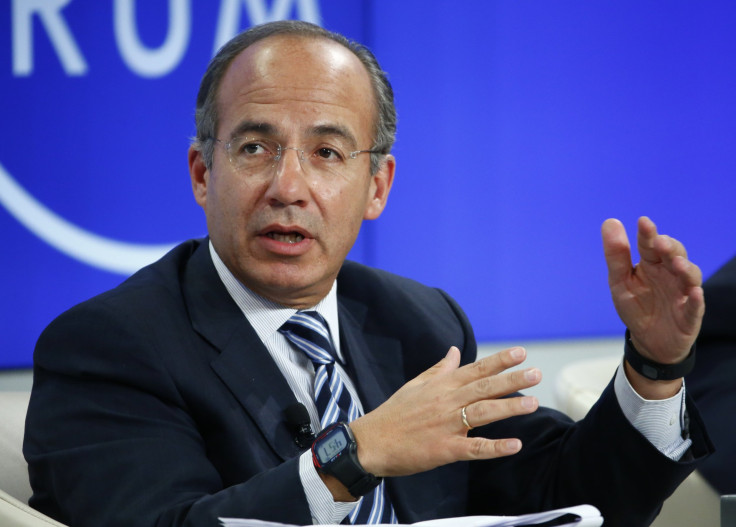Mexico’s Former President Declared Persona Non Grata In Venezuela Over Twitter Comments

Former Mexican President Felipe Calderón found himself banned from Venezuela this week over what Venezuelan officials termed “aggression.” Calderon’s crime: Speaking ill of Venezuela’s soccer team on Twitter.
Calderón, who served as Mexico’s president from 2006 to 2012, took to his Twitter account, @FelipeCalderon, to comment on soccer matches in the America’s Cup, currently under way in Chile. On Sunday, he sent out a tweet about the Venezuelan soccer team during its game against Colombia.
“What a pity, what a dirty game from the Venezuelan team,” he wrote. “It appears that [Venezuelan President Nicolas] Maduro trained them.”
Qué pena, qué juego tan sucio del equipo de Venezuela. Parece que los entrenó Maduro...
— Felipe Calderón (@FelipeCalderon) June 14, 2015The tweet sparked a flurry of angry responses from Venezuelans, including state governor Tarek El Aissami, a soccer player himself. “What’s dirty is you and your miserable history,” he responded. “Respect our people.” The message was retweeted on President Nicolas Maduro’s own account.
SUCIO es usted y su historia miserable. RESPETE a nuestro pueblo “@FelipeCalderon: Qué pena, qué juego tan sucio del equipo de Venezuela..
— Tareck El Aissami (@TareckPSUV) June 14, 2015Hours later, Venezuela ended up winning the game, and Calderón congratulated them. “Vinotinto’s win is very deserving,” he wrote, referring to the Venezuelan soccer team’s nickname -- “Red Wine,” for the color of the team jersey. “In the end, the Colombian stars couldn’t do it. Congratulations to Venezuela.”
Muy merecido el triunfo de la #Vinotinto. Al final los estrellas colombianos no pudieron. Felicidades a Venezuela
— Felipe Calderón (@FelipeCalderon) June 14, 2015By this point, however, the damage had already been done. On Tuesday, Venezuelan lawmakers put out a declaration repudiating Calderón and declaring him persona non grata -- a person unwelcome in Venezuela. Calderón's message was one of “profound hate of the Bolivarian Revolution” and “forms part of the international campaign against our country,” lawmaker Earle Herrera said during the congressional debate, according to Venezuela’s state news agency.
Calderón tweeted about the declaration Tuesday. “Thank you @NicolasMaduro for declaring me ‘persona non grata,’ ” he wrote. “Coming from him, it’s an honor for me. It would be worrisome to please a despot.”
Agradezco a @NicolasMaduro que me declare "persona non-grata". Viniendo de él es un honor para mí. Grave sería ser grato para un déspota.
— Felipe Calderón (@FelipeCalderon) June 17, 2015The Venezuelan National Assembly’s declaration isn’t binding. In April, Caracas also declared Spain’s former prime minister, Felipe González, persona non grata over his support for Venezuelan political prisoners. Even so, he visited Caracas last week to visit with the prisoners’ families and supporters. But the government didn’t make his trip easy: Authorities barred him from visiting Leopoldo Lopez, one of the country’s highest-profile political prisoners, and circulated a social media hashtag pressuring González to leave the country.
Venezuela has issued formal visa bans on other officials abroad, effectively blocking them from visiting the country. In March, President Maduro announced the government would freeze visas for a number of U.S. politicians, including former President George W. Bush, former Vice President Dick Cheney, Florida Reps. Ileana Ros-Lehtinen and Mario Diaz-Balart, New Jersey Sen. Bob Menendez, and Florida Sen. Marco Rubio.
© Copyright IBTimes 2024. All rights reserved.






















